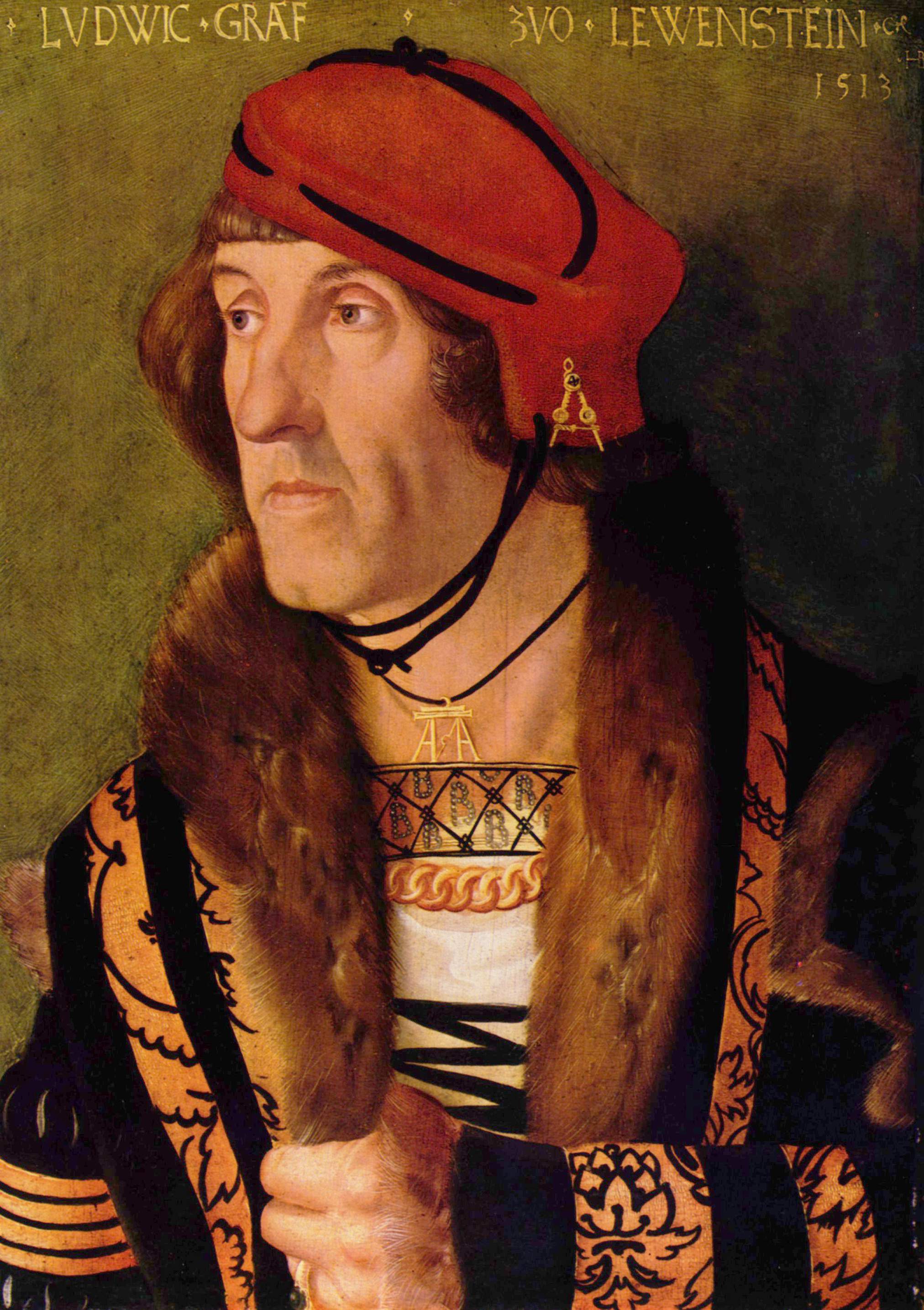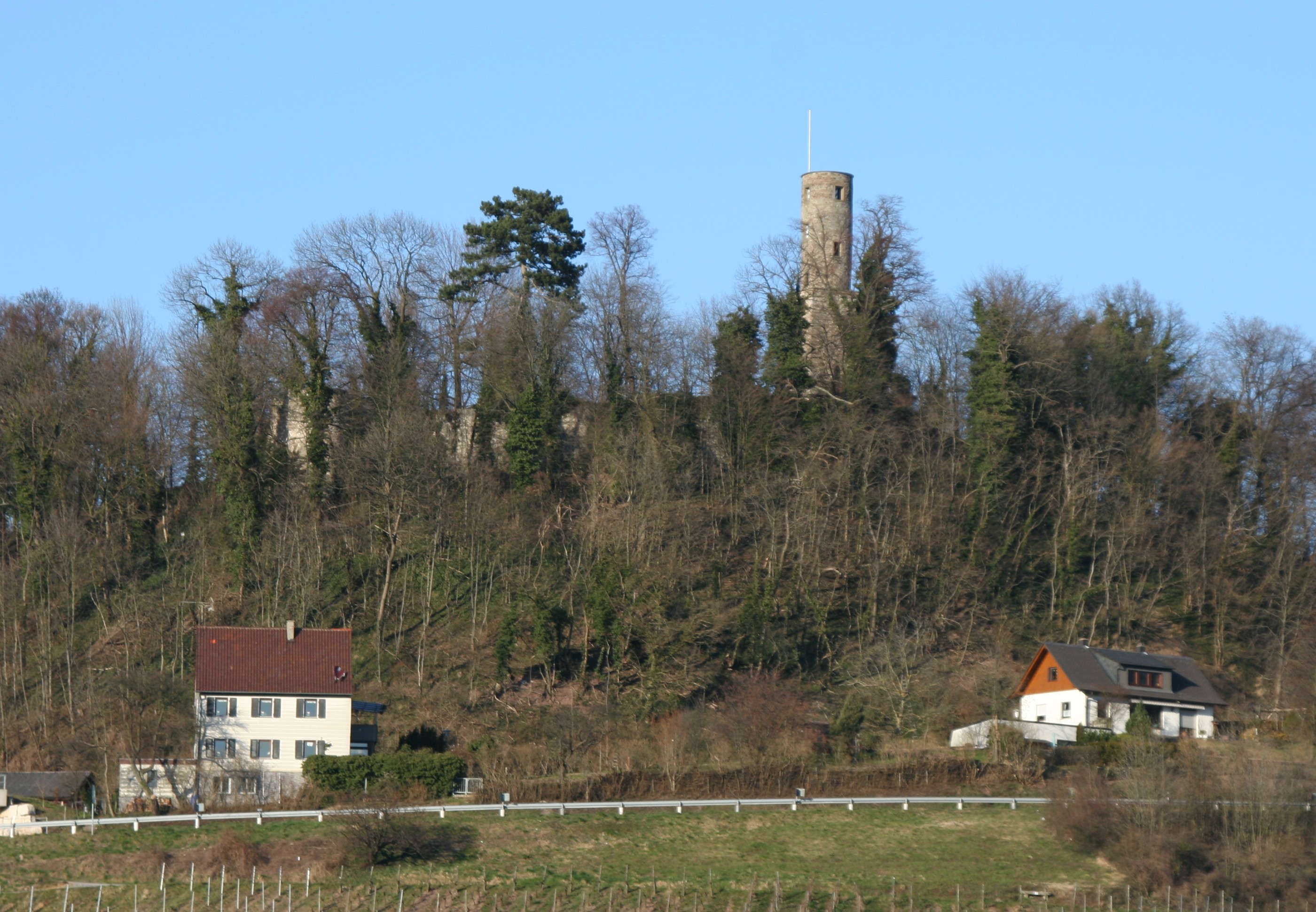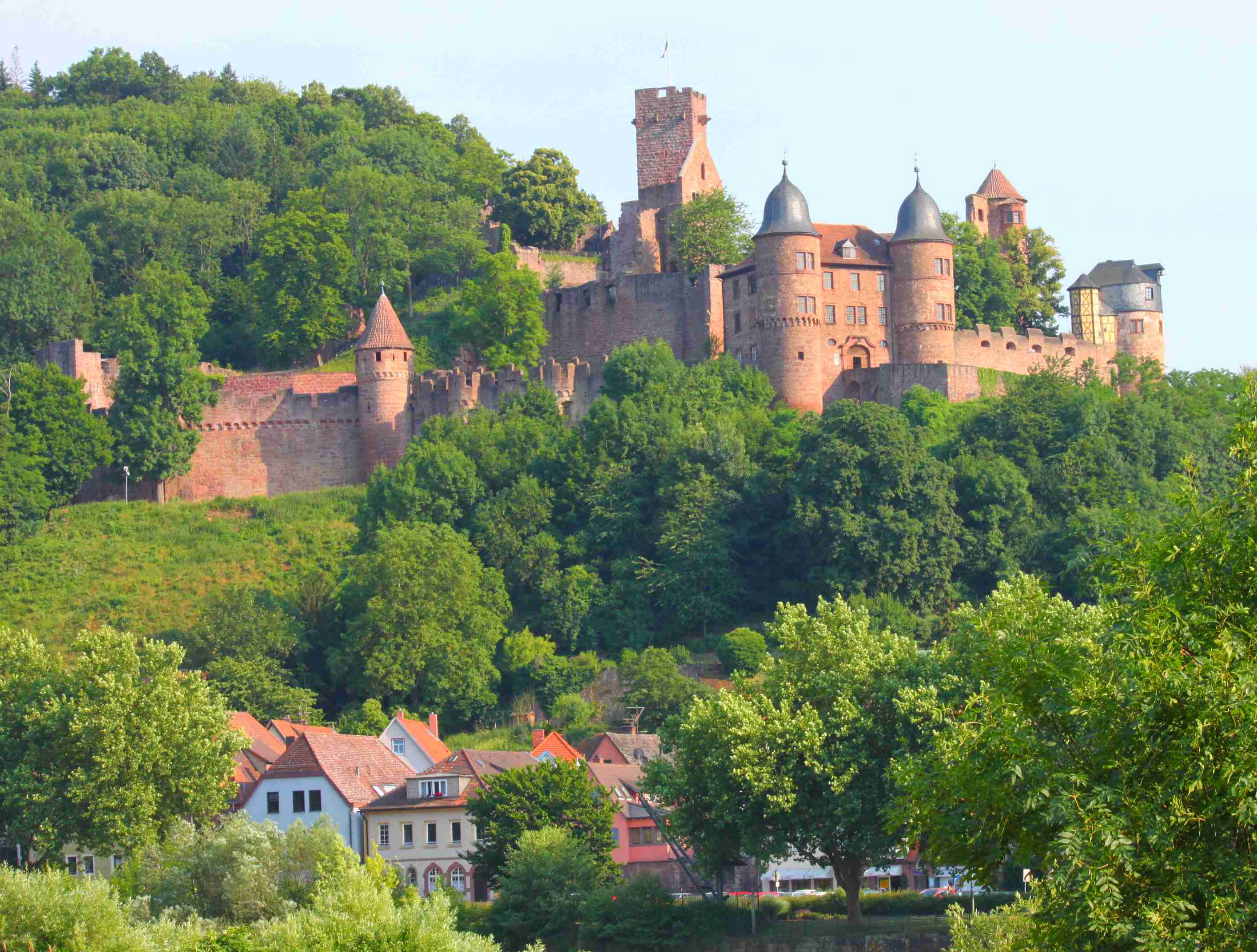Löwenstein-Wertheim on:
[Wikipedia]
[Google]
[Amazon]
 Löwenstein-Wertheim was a county of the
Löwenstein-Wertheim was a county of the
 The county of Löwenstein belonged to a branch of the family of the counts of
The county of Löwenstein belonged to a branch of the family of the counts of
 * Ludwig I, Count 1494–1523 (1463-1523), ''only surviving son of Friedrich I, Elector Palatine by his
* Ludwig I, Count 1494–1523 (1463-1523), ''only surviving son of Friedrich I, Elector Palatine by his
 *
*
 * John Dietrich, Count 1611–1644 (1585-1644), ''fourth son of Ludwig III, Count of Löwenstein-Wertheim, co-heir with his brothers''
** Ferdinand Karl, Count 1644–1672 (1616-1672)
*** Maximilian Karl, Count 1672–1712 (1656-1718), raised to Prince 1712
* John Dietrich, Count 1611–1644 (1585-1644), ''fourth son of Ludwig III, Count of Löwenstein-Wertheim, co-heir with his brothers''
** Ferdinand Karl, Count 1644–1672 (1616-1672)
*** Maximilian Karl, Count 1672–1712 (1656-1718), raised to Prince 1712
 * Dominik Konstantin, 4th Prince of Löwenstein-Wertheim-Rosenberg 1803–1814, ''previously Prince of Löwenstein-Wertheim-Rochefort''
** Karl Thomas, 5th Prince 1814–1849 (1783-1849)
*** '' Constantine, Hereditary Prince of Löwenstein-Wertheim-Rosenberg (1802-1838)''
**** Karl, 6th Prince 1849–1908, ''abdicated to take Roman Catholic orders'' (1834-1921)
***** Aloys, 7th Prince 1908–1952 (1871-1952)
****** Karl, 8th Prince 1952–1990 (1904-1990)
******* Alois-Konstantin, 9th Prince 1990–present (born 1941)
******** '' Carl Friedrich, Hereditary Prince of Löwenstein-Wertheim-Rosenberg (1966–2010)
********* Nicodemus, Hereditary Prince of Löwenstein-Wertheim-Rosenberg (born 2001)
********* Prince Laurentius (born 2006)
******** Prince Hubertus (born 1968)
******** Prince Dominik (born 1983)
****** ''Prince Johannes of Löwenstein-Wertheim-Rosenberg (1919–2000)''
******* Prince Michael (born 1950)
******** Prince Konstantin (born 1995)
******* Prince Karl (born 1952)
******** Prince Philipp (born 1979)
******** Prince Felix (born 1984)
******* Prince Felix (born 1954)
******* Prince Martin (born 1961)
******* Prince Stephan (born 1968)
******** Prince Nikolaus (born 2004)
* Dominik Konstantin, 4th Prince of Löwenstein-Wertheim-Rosenberg 1803–1814, ''previously Prince of Löwenstein-Wertheim-Rochefort''
** Karl Thomas, 5th Prince 1814–1849 (1783-1849)
*** '' Constantine, Hereditary Prince of Löwenstein-Wertheim-Rosenberg (1802-1838)''
**** Karl, 6th Prince 1849–1908, ''abdicated to take Roman Catholic orders'' (1834-1921)
***** Aloys, 7th Prince 1908–1952 (1871-1952)
****** Karl, 8th Prince 1952–1990 (1904-1990)
******* Alois-Konstantin, 9th Prince 1990–present (born 1941)
******** '' Carl Friedrich, Hereditary Prince of Löwenstein-Wertheim-Rosenberg (1966–2010)
********* Nicodemus, Hereditary Prince of Löwenstein-Wertheim-Rosenberg (born 2001)
********* Prince Laurentius (born 2006)
******** Prince Hubertus (born 1968)
******** Prince Dominik (born 1983)
****** ''Prince Johannes of Löwenstein-Wertheim-Rosenberg (1919–2000)''
******* Prince Michael (born 1950)
******** Prince Konstantin (born 1995)
******* Prince Karl (born 1952)
******** Prince Philipp (born 1979)
******** Prince Felix (born 1984)
******* Prince Felix (born 1954)
******* Prince Martin (born 1961)
******* Prince Stephan (born 1968)
******** Prince Nikolaus (born 2004)
 * Johann Karl, 1st Prince 1812–1816 (1740-1816), ''the last Count of Löwenstein-Wertheim-Virneburg''
** Georg Wilhelm Ludwig, 2nd Prince 1816–1855 (1775-1855)
***
* Johann Karl, 1st Prince 1812–1816 (1740-1816), ''the last Count of Löwenstein-Wertheim-Virneburg''
** Georg Wilhelm Ludwig, 2nd Prince 1816–1855 (1775-1855)
***
Lowenstein-Wertheim at Landesarchiv Baden-WĂĽrttemberg
{{DEFAULTSORT:Lowenstein-Wertheim Counties of the Holy Roman Empire Franconian Circle House of Wittelsbach
 Löwenstein-Wertheim was a county of the
Löwenstein-Wertheim was a county of the Holy Roman Empire
The Holy Roman Empire was a political entity in Western, Central, and Southern Europe that developed during the Early Middle Ages and continued until its dissolution in 1806 during the Napoleonic Wars.
From the accession of Otto I in 962 ...
, part of the Franconian Circle
The Franconian Circle (german: Fränkischer Reichskreis) was an Imperial Circle established in 1500 in the centre of the Holy Roman Empire. It comprised the eastern part of the former Franconian stem duchy—roughly corresponding with the pre ...
. It was formed from the counties of Löwenstein (based in the town of Löwenstein) and Wertheim (based in the town of Wertheim am Main
Wertheim ( East Franconian: ''Wärde'') is a town in southwestern Germany, in the state of Baden-Württemberg with a population of around 23,400. It is located on the confluence of the rivers Tauber and Main. Wertheim is best known for its l ...
) and from 1488 until 1806 ruled by the House of Löwenstein-Wertheim who are morganatic descendants (and the most senior line) of the Palatinate branch of the House of Wittelsbach.
History
 The county of Löwenstein belonged to a branch of the family of the counts of
The county of Löwenstein belonged to a branch of the family of the counts of Calw
Calw (; previously pronounced and sometimes spelled ''Kalb'' accordingly) is a town in the middle of Baden-WĂĽrttemberg in the south of Germany, capital and largest town of the district Calw. It is located in the Northern Black Forest and is a ...
before 1281, when it was purchased by the German king Rudolph I of Habsburg, who presented it to his natural son Albert. In 1441 Henry, one of Albert's descendants, sold it to Frederick I, Count Palatine of the Rhine, head of the Palatine branch of the house of Wittelsbach, and later it served as a portion for Louis (1494-1524), a son of the elector by a morganatic marriage, who became a count of the Empire in 1494. Louis obtained Löwenstein in Swabia and received from Emperor Maximilian I the title of ''Count of Löwenstein''.
The family lost Löwenstein to Ulrich, Duke of Württemberg, but Louis III, Count of Löwenstein, through his marriage to Anna, heiress of the Count of Wertheim, obtained that territory. Louis III left two sons: Christopher Louis, a Lutheran, and John Dietrich, who remained a Catholic, so the family was divided in two: ''Löwenstein-Wertheim-Freudenberg'', a Lutheran branch, and ''Löwenstein-Wertheim-Rosenberg'', a Catholic one. The heads of the two branches, into which the older and Protestant line was afterwards divided, were made princes by the king of Bavaria in 1812 and by the king of Württemberg in 1813; the head of the younger, or Roman Catholic line, was made a prince of the Empire in 1711.
With the dissolution of the Holy Roman Empire in 1806, the county was mediatized and its territory was split among Bavaria, Baden, Württemberg, and Hesse. Under the protocol of Frankfurt on 20 July 1819 all the family lands were mediatised. The area of the county of Löwenstein was about .
The current monarchs of Belgium
Belgium, ; french: Belgique ; german: Belgien officially the Kingdom of Belgium, is a country in Northwestern Europe. The country is bordered by the Netherlands to the north, Germany to the east, Luxembourg to the southeast, France to th ...
, Luxembourg
Luxembourg ( ; lb, Lëtzebuerg ; french: link=no, Luxembourg; german: link=no, Luxemburg), officially the Grand Duchy of Luxembourg, ; french: link=no, Grand-Duché de Luxembourg ; german: link=no, Großherzogtum Luxemburg is a small lan ...
, and Liechtenstein
Liechtenstein (), officially the Principality of Liechtenstein (german: link=no, FĂĽrstentum Liechtenstein), is a German-speaking microstate located in the Alps between Austria and Switzerland. Liechtenstein is a semi-constitutional monarch ...
, as well as the pretenders to the thrones of Portugal
Portugal, officially the Portuguese Republic ( pt, RepĂşblica Portuguesa, links=yes ), is a country whose mainland is located on the Iberian Peninsula of Southwestern Europe, and whose territory also includes the Atlantic archipelagos of ...
, Italy
Italy ( it, Italia ), officially the Italian Republic, ) or the Republic of Italy, is a country in Southern Europe. It is located in the middle of the Mediterranean Sea, and its territory largely coincides with the homonymous geographical ...
(Naples branch), Bavaria
Bavaria ( ; ), officially the Free State of Bavaria (german: Freistaat Bayern, link=no ), is a state in the south-east of Germany. With an area of , Bavaria is the largest German state by land area, comprising roughly a fifth of the total lan ...
, and Austria-Hungary
Austria-Hungary, often referred to as the Austro-Hungarian Empire,, the Dual Monarchy, or Austria, was a constitutional monarchy and great power in Central Europe between 1867 and 1918. It was formed with the Austro-Hungarian Compromise of ...
are descended (not in the male line) from the Rosenberg branch. Rupert zu Löwenstein, the longtime financial manager of the Rolling Stones
The Rolling Stones are an English Rock music, rock band formed in London in 1962. Active for six decades, they are one of the most popular and enduring bands of the album era, rock era. In the early 1960s, the Rolling Stones pioneered the g ...
, was a member of the Freudenberg branch.
Rulers of Löwenstein
Counts of Löwenstein (1494–1571) * Ludwig I, Count 1494–1523 (1463-1523), ''only surviving son of Friedrich I, Elector Palatine by his
* Ludwig I, Count 1494–1523 (1463-1523), ''only surviving son of Friedrich I, Elector Palatine by his morganatic
Morganatic marriage, sometimes called a left-handed marriage, is a marriage between people of unequal social rank, which in the context of royalty or other inherited title prevents the principal's position or privileges being passed to the spous ...
marriage''
** Ludwig II, Count 1523–1536 (1498-1536)
** Friedrich I, Count 1536–1541 (1502-1541)
*** Wolfgang I, Count 1541–1571 (1527-1571), ''eldest son''
Counts of Löwenstein-Scharffeneck (1571–1633)
* Wolfgang II, Count 1571–1596 (1555-1596), ''eldest son of Wolfgang I, Count of Löwenstein'' ** Georg Ludwig, Count 1596–1633 (1587-1633) Georg Ludwig survived his only son, with this line becoming extinct. His daughter and heiress Maria Christina of Löwenstein-Scharffeneck (1625–1673) married Gabriel Oxenstierna, Count ofKorsholm
Korsholm (; fi, Mustasaari) is a municipality of Finland. The town of Vaasa was founded in Korsholm parish in 1606 and today the municipality completely surrounds the city. It is a coastal, mostly rural municipality, consisting of a rural landscap ...
and Vaasa
Vaasa (; sv, Vasa, , Sweden ), in the years 1855–1917 as Nikolainkaupunki ( sv, Nikolajstad; literally meaning "city of Nicholas),
(1619–1673). The further Counts of Korsholm
Korsholm (; fi, Mustasaari) is a municipality of Finland. The town of Vaasa was founded in Korsholm parish in 1606 and today the municipality completely surrounds the city. It is a coastal, mostly rural municipality, consisting of a rural landscap ...
and Vaasa
Vaasa (; sv, Vasa, , Sweden ), in the years 1855–1917 as Nikolainkaupunki ( sv, Nikolajstad; literally meaning "city of Nicholas),
were their descendants.
Counts of Löwenstein-Wertheim (1571–1636)
 *
* Ludwig III
Ludwig III (Ludwig Luitpold Josef Maria Aloys Alfried; 7 January 1845 – 18 October 1921) was the last King of Bavaria, reigning from 1913 to 1918. Initially he served in the Bavarian military as a lieutenant and went on to hold the rank of Oberl ...
, Count 1571–1611 (1530-1611), ''third surviving son of Friedrich I, Count of Löwenstein, married heiress of Wertheim am Main
Wertheim ( East Franconian: ''Wärde'') is a town in southwestern Germany, in the state of Baden-Württemberg with a population of around 23,400. It is located on the confluence of the rivers Tauber and Main. Wertheim is best known for its l ...
.''
** Ludwig IV, Count 1611–1635 (1569-1635), second son, co-heir with his brothers
** Wolfgang Ernst, Count 1611–1636 (1578-1636), third son, co-heir with his brothers
Ludwig IV has no known descendants. Wolfgang Ernst only had one daughter, Dorothea Walpurga of Löwenstein-Wertheim (1628–1634) who predeceased him. Their lines were extinct with their own deaths.
Counts of Löwenstein-Wertheim-Virneburg (1611–1812)
* Christof Ludwig, Count 1611–1618 (1568-1618), ''eldest son of Ludwig III, Count of Löwenstein-Wertheim, co-heir with his brothers, married the heiress of Virneburg'' ** Friedrich Ludwig, Count 1618–1657 (1598-1657) *** Ludwig Ernst, Count 1657–1681 (1627-1681) ****Joachim Friedrich
Joachim Frederick (27 January 1546 – 18 July 1608), of the House of Hohenzollern, was Prince-elector of the Margraviate of Brandenburg from 1598 until his death.
Biography
Joachim Frederick was born in Cölln to John George, Elector of Branden ...
, Count 1681–1689 (1666-1689)
**** Eucharius Kasimir, Count 1689–1698 (1668-1698)
*** ''Count Friedrich Eberhard of Löwenstein-Wertheim-Virneburg (1629-1683)'' married Otillie, daughter of Otto, Count of Lippe-Brake
Otto, Count of Lippe-Brake (21 December 1589 – 18 November 1657 in Blomberg) was the first ruling Count of Lippe-Brake.
Life
Otto was born on 21 December 1589 as the son of Count Simon VI and his wife, Elisabeth of Holstein-Schaumburg (b. ...
**** Heinrich Friedrich, Count 1698–1721 (1682-1721)
***** Johann Ludwig Vollrath, Count 1721–1790 (1705-1790)
****** Johann Karl Ludwig, Count 1790–1812 (1740-1816), raised to Prince of Löwenstein-Wertheim-Freudenberg
Counts of Löwenstein-Wertheim-Rochefort (1611–1712)
 * John Dietrich, Count 1611–1644 (1585-1644), ''fourth son of Ludwig III, Count of Löwenstein-Wertheim, co-heir with his brothers''
** Ferdinand Karl, Count 1644–1672 (1616-1672)
*** Maximilian Karl, Count 1672–1712 (1656-1718), raised to Prince 1712
* John Dietrich, Count 1611–1644 (1585-1644), ''fourth son of Ludwig III, Count of Löwenstein-Wertheim, co-heir with his brothers''
** Ferdinand Karl, Count 1644–1672 (1616-1672)
*** Maximilian Karl, Count 1672–1712 (1656-1718), raised to Prince 1712
Princes of Löwenstein-Wertheim-Rochefort (1712–1803)
* Maximilian Karl Albert, 1st Prince 1712–1718 (1656-1718), ''the last Count of Löwenstein-Wertheim-Rochefort'' ** Dominikus Marquard, 2nd Prince 1718–1735 (1690-1735) *** Karl Thomas, 3rd Prince 1735–1789 (1714-1789) *** ''Prince Theodor Alexander (1722-1780)'' **** Dominik Konstantin, 4th Prince 1789–1803 (1762-1814), Princely title changed 1803Princes of Löwenstein-Wertheim-Rosenberg (1803–present)
 * Dominik Konstantin, 4th Prince of Löwenstein-Wertheim-Rosenberg 1803–1814, ''previously Prince of Löwenstein-Wertheim-Rochefort''
** Karl Thomas, 5th Prince 1814–1849 (1783-1849)
*** '' Constantine, Hereditary Prince of Löwenstein-Wertheim-Rosenberg (1802-1838)''
**** Karl, 6th Prince 1849–1908, ''abdicated to take Roman Catholic orders'' (1834-1921)
***** Aloys, 7th Prince 1908–1952 (1871-1952)
****** Karl, 8th Prince 1952–1990 (1904-1990)
******* Alois-Konstantin, 9th Prince 1990–present (born 1941)
******** '' Carl Friedrich, Hereditary Prince of Löwenstein-Wertheim-Rosenberg (1966–2010)
********* Nicodemus, Hereditary Prince of Löwenstein-Wertheim-Rosenberg (born 2001)
********* Prince Laurentius (born 2006)
******** Prince Hubertus (born 1968)
******** Prince Dominik (born 1983)
****** ''Prince Johannes of Löwenstein-Wertheim-Rosenberg (1919–2000)''
******* Prince Michael (born 1950)
******** Prince Konstantin (born 1995)
******* Prince Karl (born 1952)
******** Prince Philipp (born 1979)
******** Prince Felix (born 1984)
******* Prince Felix (born 1954)
******* Prince Martin (born 1961)
******* Prince Stephan (born 1968)
******** Prince Nikolaus (born 2004)
* Dominik Konstantin, 4th Prince of Löwenstein-Wertheim-Rosenberg 1803–1814, ''previously Prince of Löwenstein-Wertheim-Rochefort''
** Karl Thomas, 5th Prince 1814–1849 (1783-1849)
*** '' Constantine, Hereditary Prince of Löwenstein-Wertheim-Rosenberg (1802-1838)''
**** Karl, 6th Prince 1849–1908, ''abdicated to take Roman Catholic orders'' (1834-1921)
***** Aloys, 7th Prince 1908–1952 (1871-1952)
****** Karl, 8th Prince 1952–1990 (1904-1990)
******* Alois-Konstantin, 9th Prince 1990–present (born 1941)
******** '' Carl Friedrich, Hereditary Prince of Löwenstein-Wertheim-Rosenberg (1966–2010)
********* Nicodemus, Hereditary Prince of Löwenstein-Wertheim-Rosenberg (born 2001)
********* Prince Laurentius (born 2006)
******** Prince Hubertus (born 1968)
******** Prince Dominik (born 1983)
****** ''Prince Johannes of Löwenstein-Wertheim-Rosenberg (1919–2000)''
******* Prince Michael (born 1950)
******** Prince Konstantin (born 1995)
******* Prince Karl (born 1952)
******** Prince Philipp (born 1979)
******** Prince Felix (born 1984)
******* Prince Felix (born 1954)
******* Prince Martin (born 1961)
******* Prince Stephan (born 1968)
******** Prince Nikolaus (born 2004)
Princes of Löwenstein-Wertheim-Freudenberg (1812–present)
 * Johann Karl, 1st Prince 1812–1816 (1740-1816), ''the last Count of Löwenstein-Wertheim-Virneburg''
** Georg Wilhelm Ludwig, 2nd Prince 1816–1855 (1775-1855)
***
* Johann Karl, 1st Prince 1812–1816 (1740-1816), ''the last Count of Löwenstein-Wertheim-Virneburg''
** Georg Wilhelm Ludwig, 2nd Prince 1816–1855 (1775-1855)
*** Adolf
Adolf (also spelt Adolph or Adolphe, Adolfo and when Latinised Adolphus) is a given name used in German-speaking countries, Scandinavia, the Netherlands and Flanders, France, Italy, Spain, Portugal, Latin America and to a lesser extent in vari ...
, 3rd Prince 1855–1861 (1805-1861)
** ''Prince Wilhelm Ernst (1783-1847)''
*** Wilhelm
Wilhelm may refer to:
People and fictional characters
* William Charles John Pitcher, costume designer known professionally as "Wilhelm"
* Wilhelm (name), a list of people and fictional characters with the given name or surname
Other uses
* Mount ...
, 4th Prince 1861–1887 (1817-1887)
**** Ernst Alban Ludwig, 5th Prince 1887–1931 (1854-1931), ''abdicated 1918''
**** ''Prince Alfred (1855-1925)''
***** Udo
Udo is a masculine given name. It may refer to:
People Medieval era
*Udo of Neustria, 9th century nobleman
* Udo (Obotrite prince) (died 1028)
* Udo (archbishop of Trier) (c. 1030 – 1078)
* Lothair Udo II, Margrave of the Nordmark (c. 1025 †...
, 6th Prince 1931–1980 (1896-1980)
****** Alfred-Ernst, 7th Prince 1980–2010 (1924-2010)
******* Ludwig, 8th Prince 2010–present (born 1951)
******** Ludwig, Hereditary Prince
A crown prince or hereditary prince is the heir apparent to the throne in a royal or imperial monarchy. The female form of the title is crown princess, which may refer either to an heiress apparent or, especially in earlier times, to the wife ...
of Löwenstein-Wertheim-Freudenberg (born 1994)
******* Prince Udo (born 1957)
******** Prince Georg (born 1993)
******** Prince Philipp (born 1998)
**** ''Prince Wilhelm Gustav Ludwig (1863-1915)''
***** ''Prince Wolfgang Wilhelm Gustav Karl Ludwig (1890-1945)''
****** Prince Wolfram Hubertus Wilhelm Heinrich (born 1941)
******* Prince Wolfram Michael Nikolaus Friedrich Jakob (born 1980)
**** '' Prince Ludwig Karl (1864-1899)''
Notes
References
*External links
Lowenstein-Wertheim at Landesarchiv Baden-WĂĽrttemberg
{{DEFAULTSORT:Lowenstein-Wertheim Counties of the Holy Roman Empire Franconian Circle House of Wittelsbach